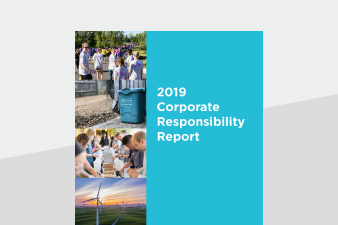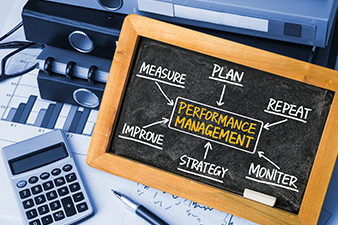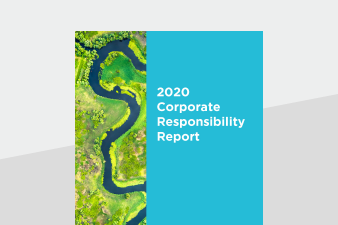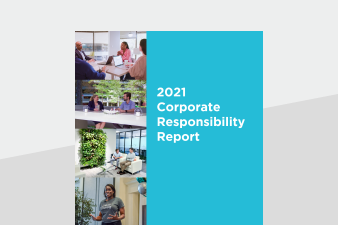
Introduction
While investors have pushed for companies to address environmental, social, and governance (ESG) issues for some time now, COVID-19 and recent protests against racial injustice have forced some businesses to reevaluate their strategies and commitments to these topics. Businesses that are better prepared to handle these challenges are often those which evaluate ESG issues as part of their corporate strategy—not standalone initiatives.
In his 2018 letter to CEOs, BlackRock’s CEO Larry Fink wrote that “companies must benefit all of their stakeholders, including shareholders, employees, customers, and the communities in which they operate.” Fink emphasized that companies must serve a social purpose. “To prosper over time, every company must not only deliver financial performance, but also show how it makes a positive contribution to society.”
In addition to increased pressure from investors, companies are facing growing expectations to take positions on ESG issues that are important to customers. According to an Axios/Harris 100 poll in March 2020, brands with the best reputations among consumers are ones that stand for issues, regardless of the political nature of the issue.[1] Companies that ranked higher across a range of ESG criteria also experience stronger financial performance—41 of the 56 Morningstar’s ESG indexes outperformed their non-ESG equivalents (73%) since inception.[2]
As companies tackle ESG issues, they may find themselves at different stages of the maturity curve from initial steps, like creating dedicated sustainability positions or a sustainability department, to the leading practice of integrating ESG goals into corporate strategy. Sustainability professionals looking to integrate ESG issues into corporate strategy should consider the following initial steps:
Integrate ESG Strategy into Corporate Strategy and Business Planning Processes
Companies must first identify ESG material issues and develop ESG initiatives to address gaps in the business strategy:
- Conduct a materiality assessment – If sustainability professionals do not have strong relationships with their C-suite or board, a valuable tool to build that relationship is a materiality assessment. As described in our materiality assessment for electric utilities, a materiality assessment is a structured exercise that helps a company identify specific ESG issues that need attention by surveying or interviewing both internal and external stakeholders on their key priorities.
- Identify gaps to achieving ESG objectives – Once material ESG issues and associated indicators have been identified through the materiality assessment, identify gaps in the company’s current performance and develop a strategy to close those gaps. To ensure that ESG issues are not addressed as standalone initiatives, it is imperative that these strategies are incorporated into the company’s corporate strategy and business plans.
- Integrate ESG targets with financial goals – Once an ESG strategy has been identified and incorporated into the company’s corporate strategy, targets and metrics should be developed around these issues, while ensuring these metrics are integrated into the company’s financial goals and addressed as part of the annual-planning cycle.
- Offer ESG-focused solutions to current challenges – Sustainability professionals should also be agile enough to quickly propose ESG-focused solutions or identify ESG challenges in response to current events. The COVID-19 pandemic impacts of this year provide a recent example—undoubtedly these impacts are being examined at all levels, including corporate boards.
Ensure Organizational Alignment All the Way Up to the Board
To elevate ESG topics to the highest levels of the organization, sustainability professionals must engage the right stakeholders at various levels of the company:
- Engage with the CFO – Bringing the CFO onboard prior to conversations with the board will be critical to bridging the gap between sustainability and financial performance. As investors demand more information around ESG risk management, the CFO will be best-positioned to speak value creation associated with ESG initiatives.
- Establish communication channels – Developing strong communication channels between the sustainability team and other important internal stakeholders, including the CFO, chief risk officer, investor relations, and finance, will enable information sharing to inform corporate strategy.
- Create an ESG steering committee – Forming a committee for ESG issues ensures that the right amount of time and expertise is dedicated to ESG initiatives. This committee should provide formal guidance, oversee, and drive the implementation of ESG strategies and activities.
- Leverage an external advisory council – Creating and managing an external advisory council, which brings experts to the table across various stakeholder groups such as banks, NGOs, and subject matter experts, can build the board’s expertise and comfort level with the ESG team while providing validation on the importance of ESG issues from a third party.
- Integrate ESG issues into board-level engagement – A straightforward way to ensure that ESG issues are elevated to the board level is to focus on a topic that is sure to be discussed during board meetings (e.g., responses to current events like company initiatives around employee health and wellness or racial equity policies).
Leverage Existing Reporting Requirements to Communicate ESG Issues
Reporting is not a new exercise for publicly traded companies; however, sustainability groups often find they report according to standards separate from required SEC filings. Sustainability professionals often find themselves needing to explain various non-mandatory sustainability-reporting frameworks to others in their organization as they conduct data requests and interviews.
While there is merit to reporting according to sustainability-specific frameworks, such as Global Reporting Initiative (GRI) and CDP, integrating ESG issues into a risk management lens is one of the quickest ways to elevate these topics to the board level. Developing relationships with financial or risk management groups within the company may be a challenging task; however, sustainability groups can act as a valuable source of information for non-financial material information and help companies avoid using boilerplate language that may not provide investors with relevant insight.
Recently launched reporting frameworks, such as the Sustainability Accounting Standards Board (SASB), aim to develop clear guidance for companies to identify and report material ESG risks directly into SEC filings. Such integrated reporting will require complex collaboration across group lines, but it will also ensure stakeholders across companies are speaking the same language when it comes to ESG and overall corporate risk.
Sustainability professionals can start by considering ESG-related risks within the organization’s overall risk assessment. Many companies will find that applying frameworks offered by SASB or others is an opportunity to help identify those risks and shape the narrative into a decision-useful format for investors and stakeholders.
Conclusion
Moving beyond traditional silos and integrating ESG considerations into corporate strategy will enable companies to be proactive in managing issues material to their business. Integrating ESG strategy into corporate strategy requires strong collaboration and support from various groups within a company, but it will prove invaluable as companies navigate the changing business landscape. Read our inaugural 2019 Corporate Responsibility Report for a glimpse into our efforts to integrate ESG issues into corporate strategy.
How ScottMadden Can Help
Developing and maintaining a competitive advantage in today’s rapidly changing business environment is more and more challenging. Implementing effective ESG practices is key to strengthening organizations’ positions in the market and securing long-term value for all stakeholders.
We have experience performing stakeholder assessments, risk analyses, and enterprise sustainability projects for a variety of clients, including utilities, public entities, media and entertainment companies, renewable energy developers, and industrial companies. Reach out to ScottMadden for support with your ESG strategy and reporting today.
About ScottMadden, Inc.
ScottMadden is the management consulting firm that does what it takes to get it done right. We consult in two main areas—Energy and Corporate & Shared Services. We deliver a broad array of consulting services ranging from strategic planning through implementation across many industries, business units, and functions. To learn more, visit www.scottmadden.com | Twitter | Facebook | LinkedIn.
Additional Contributing Author: Tina Jeffress
[1] https://www.axios.com/axios-harris-poll-corporate-reputations-bcc0c03d-0bb5-4eb1-b591-4622bb4b01ed.html
[2] https://www.morningstar.com/insights/2019/03/12/esg-investing-perfor_0


























